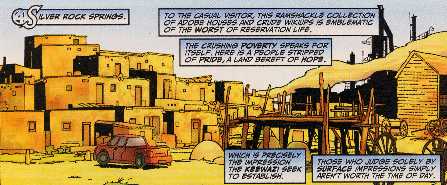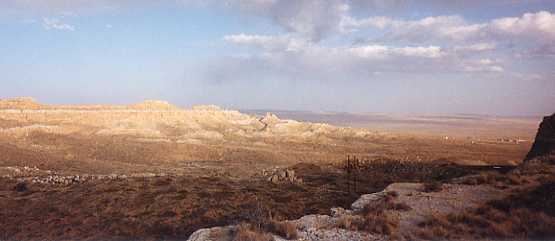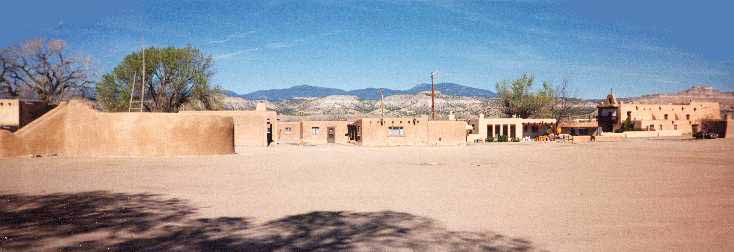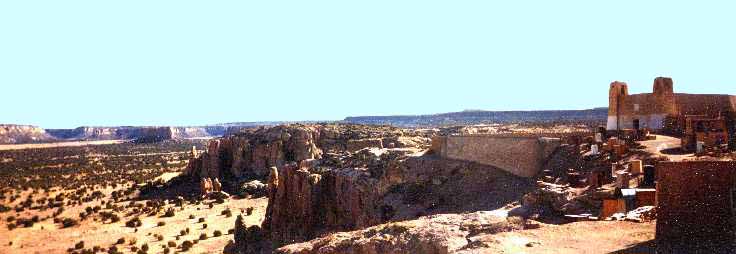Home |
Contents |
Photos |
News |
Reviews |
Store |
Forum |
ICI |
Educators |
Fans |
Contests |
Help |
FAQ |
Info


Should Indians Cling to Reservations?
(10/15/03)

Let me tell you just a little something about the American Indian in our land. We have provided millions of acres of land for what are called preservations—or reservations, I should say. They, from the beginning, announced that they wanted to maintain their way of life, as they had always lived there in the desert and the plains and so forth. And we set up these reservations so they could, and have a Bureau of Indian Affairs to help take care of them. At the same time, we provide education for them—schools on the reservations. And they're free also to leave the reservations and be American citizens among the rest of us, and many do. Some still prefer, however, that way—that early way of life. And we've done everything we can to meet their demands as to how they want to live. Maybe we made a mistake. Maybe we should not have humored them in that wanting to stay in that kind of primitive lifestyle. Maybe we should have said, no, come join us; be citizens along with the rest of us.
Ronald Reagan, Moscow State University, 5/31/88
*****
A friend sent the following commentary on the American Indian reservation system:
From a layman's perspective.
In this age, a culture based primary on geography or physical appearance or bloodlines is doomed. At some point, the Indians themselves will want to free themselves, will INSIST on freeing themselves, from the control over their lives that the reservations hold. The reservations are in effect a form of self-imprisonment. Getting welfare checks may be nice, but as [your Indian friend] Victor should assent to, a life off the reservation will, for most Indians, be much more fulfilling and provide more opportunities and DIVERSITY. I stick with my position: The reservations can be maintained as living museums to preserve the Indian culture or for economic development (e.g., casinos/businesses), but to blossom and thrive, the Indian culture must be able to transcend the reservations.
You refuse to acknowledge a single physical trait that "limits" your selection of a partner. Imagine how unbelievably confining it must be for an Indian who goes away to college to select a fellow Indian partner when there is a whole universe of alternative partners. In just a few generations the Indian bloodlines will be diluted significantly.
The notion of a culture based on geography/physical appearance/bloodlines is appealing. But it is anachronistic. It does not fit with the real cosmopolitan world we ALL live in, including the Indians.
I believe the Indian culture goes far deeper than borders and bloodlines. I believe it is a VALUE SYSTEM, a way of looking at the world, that transcends borders and bloodlines. For example, the Indian culture includes an earth-centered spirituality that everyone of us could benefit from understanding and adopting.
Survival of any culture in this era, especially one with a such small population, demands that the culture have a mechanism to allow influx and growth to offset the inevitable attrition that will occur. As it now stands, the Indians don't seem to acknowledge this. The continued exclusive focus on their (justified) legal rights regarding reservations, is, I would say, often at the expense of the need to develop and preserve a cultural identity that transcends the reservation borders. The casinos have given the Indians the financial wherewithal to "go it alone" economically. The question for them is how best to spend their time and energy -- clinging to the confines of the reservations or embracing the larger world beyond.
Rob's reply
My short answer is that many Indians in the east are already cultural units like the ones you advocate. They aren't "tied" to reservations, they've assimilated, they've intermarried, etc. Their cultures are historical artifacts as much as living, breathing things.
Most Indians in the west are tied to the land, culturally and spiritually, whether they live on the reservation or not. Their age-old cultures are still alive and active. You can ask Victor how happy he'd be if he couldn't visit his reservation once a month.

This comment
Survival of any culture in this era, especially one with a such small population, demands that the culture have a mechanism to allow influx and growth to offset the inevitable attrition that will occur.
ignores several realities:
One, mainstream culture is entering the reservations constantly through media such as television and movies. Tribes are fighting the negative effects of this cultural onslaught: violence, substance abuse, language loss, etc.
Two, Native cultures have always adapted to outside influences and continue to do so. Indians were quick to adopt guns and horses when Europeans presented them. More recently they've adopted the Western models of government and business (not always to their advantage, but still).
Three, tribes are well aware that blood quantum isn't tenable as a permanent criterion for membership. Many are already struggling with their membership requirements—hence some of the enrollment disputes. Other tribes already go by lineal descent rather than blood quantum. Inevitably the blood quantum tribes will relax their requirements or substitute other requirements.
Tribes haven't walled themselves off on their reservations. Their members frequently leave to go to school or pursue a career, then return. Meanwhile, they're also seeking to bring tourists to their reservations and expose them to their cultures. But they want to do this under controlled circumstances—again, so they can protect their traditions.
With modern technology, the question is why anyone should have to leave a rural location. Because it's poor? Reservations are poor because Indians haven't had the money to develop industries such as mining, forestry, and tourism. (And because the government and big corporations have cheated them out of their resources.) Now they're developing such industries with gaming revenue.
Do you advocate that every rural town and farming community should pull up its stakes and leave? Should the United States refuse to subsidize them by building roads to them, giving them water and electricity, delivering mail to them, etc.? Why did we electrify Tennessee in the 1930s (via the TVA) when we could've ordered everyone in the state to stop clinging to their hillbilly homeland and leave? What a colossal waste of government money!
I just read the town of Winslow, Arizona, isn't doing well. That place, made up of mostly Anglos, is suffering the same problems as the nearby Hopi and Navajo reservations. Do you feel that all 50,000 or whatever of them should give up their homes, even if they've been there for generations, and move to a big city?
If so, I haven't heard you advocate it. So far you've said only the Indians should give up and move. Why is that? Because dumb Indians "cling" to their homes but smart Anglos don't?
A followup exchange:
Also, I thought you were the one saying the Indian reservations are on the worst land (e.g., in the rocky hills). Don't many Indians want to live in the valleys/by the ocean, etc., just like many non-Indians do?
Maybe, but Indians who want to retain their cultures generally want to stay on their reservations. That's because their reservations are tied to their cultures. These cultures are land-based, linked to specific sacred sites, burial grounds, and other spots. Leaving these places means leaving (or distancing oneself) from these cultures.
As we discussed, this is just like the farming or small-town cultures across America. You can't have a farming culture in a big city by the ocean, for instance. Farmers are tied to the land culturally and so are traditional Indians.

Natives and others reply
I asked several correspondents if they had any thoughts on my friend's commentary. Here are their responses:
Overly general and vague.
Jason Spaulding
*****
As a person descended from those who kept what they could of the culture, and did not go onto the reservation, I have a rather different position.
I had to work hard to reclaim my culture. We survived alright, and kept our values, but the religion, language and music were gone. We managed to hang on to one dance. The reservation are the ONLY remaining pieces of our cultures. We cannot go back to Europe, Africa or Asia to replenish our culture, what is here is all there is. Thank the Creator and the hard-working people on the reservations who kept it alive despite the best efforts of competing religions, and the government.
The so-called welfare is payment due from aggreements made under various treaties.
The ridiculous laws the BIA has in place as to who is an Indian need to go. Only the tribes should be able to say who is a member, and what records or stories or family recollections count. Please do not confuse one with another.
Linde Knighton
*****
Yeah, pure rubbish. I suggest this author needs to study up on what "culture" really is instead of proudly informing us of his layman status. Once he does that, he'll discover that cultures are normally based on geography, religion, language, history, and to a certain degree blood lines. While culture can be exported or imported to a certain extent, it's always the strongest in the environment of its origins. Once exported, culture tends to get diluted with other cultures. The true French culture, after all, is tied to the geographical area of France, the true Italian culture is tied to the geographical area of Italy, and so on. Are they all doomed?
Anyone who mistakes a Greek wedding in New York for the extent of Greek culture is simply sadly in need of basic education in regards to the nature of culture. What this author is suggesting is that we simply assimilate to the US American culture, abandon our own culture, and replace it with ethnic curiosity objects like ethnic restaurants and the likes. Ethnic mementos are not a culture. For a culture to stay alive, an entire ethnic community is necessary for this, and that becomes an impossibility if we get scattered across a "foreign" landscape, so to speak.
As for "The reservations can be maintained as living museums to preserve the Indian culture or for economic development" who exactly is supposed to do the living in this museum, the curator? Besides, a museum doesn't preserve culture, a museum displays the relics of cultures. You can only preserve culture by living in the culture, by being part of the culture. Cultures are not stagnant, they evolve over time. How could they do this in a museum? Culture, after all, is a way of life and not something one can put behind glass to look at.
Italian-Americans, for example, are proud of keeping the Italian culture alive but they're only kidding themselves. It's the Italians in Italy who keep the Italian culture alive and evolving. Since we don't have a nation outside of the US which keeps our cultures alive for us, we have to look toward the reservations. They are, in effect, the countries that keep our cultures alive and evolving.
I fully realize that the original intent behind reservations was the establishment of concentration camps for indigenous people. Of course, now that these areas have been found to contain natural resources, it's quite obvious that the Nazi-mentality that put us there in the first place regrets not having completely exterminated us in the rather than letting us have these few small areas. This is hardly surprising.
Of course, cultures contain a value system, a way of perceiving the world, life, death, et al. Anybody in the world is free to adopt our Indian value systems, they don't need to remove us for our reservations for that. The fact, however, remains that Americana was never interested in our cultures and our value systems except to destroy them. Nothing has changed about this aspect. I'll be the last person on earth to deny NewAgers the right to invent whatever feathered religion they want to abide by just as long as they don't mistake their hodgepodge of pseudo-tribal customs for something that we Indians should participate in or we should accept as a replacement for our real spirituality. On the whole, however, I seriously doubt that corporate America is in any way interested in our earth-bound spirituality or our value systems.
As for this cosmopolitan world we all supposedly live in, well mainstream America doesn't live in a cosmopolitan world by a long shot, so who is the author to talk about what we Indians should do or not do? This is ludicrous. While the US is trying to dominate the entire world and tries to force it into universally accepting some sort of coca-colanization, it's probably quite frustrating for the movers and shakers of this ideology to realize that they can't even assimilate the indigenous people in their own country — let alone the rest of the world.
As has become obvious, the world is not interested in assimilating to a culture that's based on white American greed, the world is not interested in adopting America's estata corporate, aka fascism, so why should we Indians have any interest in it? If we feel freer off or on the reservations is for us to decide and not this author's decision to make for us.
[Pumaclaw]

Wofford weighs in
Dear Robert Schmidt,
Yeah. The initial surface impression is that the author is racist, and panicking at the thought that the "Vanishing Redman" WON'T vanish, & leave North America to be ruled forever by White culture & predominantly White bloodlines.
>> In this age, a culture based primary on geography or physical appearance or bloodlines is doomed. <<
Why? Regional cultures can be VERY well adapted to their region, and certainly, a "local" identity offers a stronger sense of self than a diffuse "global" one does. Having a strong personal/group identity, based on easily perceivable traits (appearance has little to do with it.... it's regional/cultural traits such as speechisms, food tastes, literature, religion, etc.), leads to a stronger psychological identity.
Note the case of the Jewish people.... whose identity was HIGHLY based on bloodlines arising out of a specific geographic region.... and who have survived as a people, despite minority status during millennia of exile (during which their physical appearance gradually blended towards that of the local populations).
Neh, given the WELL documented human tendency to organize along "tribal" (AKA "gang" AKA "corporate feudalism" AKA "religious", etc.) lines, it's actually the idea of a "global" identity that is doomed.... unless we locate some hostile aliens to make us stick together.
People WANT to band together in a small sub-group ("us vs. them").
>> At some point, the Indians themselves will want to free themselves, will INSIST on freeing themselves, from the control over their lives that the reservations hold. <<
Yawn. It's easy as hell to LEAVE the reservation. And the current trend is actually for urban Indians to REVERSE the process and try to reestablish ties with Reservation life (as a social "anchor"), or failing that, to create an "urban Indian" (AKA PanIndian) identity. NOT to "free themselves" by abandoning their identity as this fool hopes.
>> reservations are in effect a form of self-imprisonment. Getting welfare checks <<
Well, his being a racist fool with no knowledge of actual realities is pretty much a done conclusion, here.
>> may be nice, but as Victor should assent to, a life off the reservation will, for most Indians, be much more fulfilling <<
Hell, there's more Indians on welfare OFF the reservation than on it!
>> and provide more opportunities and DIVERSITY. I stick with my position: The reservations can be maintained as living museums to preserve the Indian culture or for economic development (e.g., casinos/businesses), but to blossom and thrive, the Indian culture must be able to transcend the reservations. <<
It already has.... and this DOESN'T require abandoning what this fool calls "the reservations".... but which is more properly defined as the "land base possessed by the sovereign Native Nations of North America".
>> You refuse to acknowledge a single physical trait that "limits" your selection of a partner. Imagine how unbelievably confining it must be for an Indian who goes away to college to select a fellow Indian partner when there is a whole universe of alternative partners. <<
No more confining than for Whites to select fellow Whites to marry, or for Blacks or Asians or Hispanics to do the same. And I'd actually go so far as to say that Indians are LESS confined here (than any group save Hispanics). Nowadays, "Indian" (and "Hispanic") are both CULTURAL groupings more than they are racial ones. "Indian" includes people of all colors & backgrounds, the common denominator being merely some degree of Native American ancestry & culture & loyalty to and/or self identification with Native America.
Remember, a "White" marries a non-White knowing full well that their children will be characterized as non-White. But Indian who marries a non-Indian knows that their children CAN still be characterized as Indian, depending on circumstances such as upbringing & enrollment.
>> In just a few generations the Indian bloodlines will be diluted significantly. <<

Which doesn't necessarily affect Indian culture or tribal identity. There are quite a few Indian tribes with largely (or even entirely) mixed blood membership. In some cases there are not even any "nearly" fullblood tribal members left, yet the tribal identity is still going strong. (I attended a Kansa tribal powwow once.... "White" looking dancers/singers outnumbered the Indian looking ones by a fair margin, but they were ALL singing traditional songs & wearing ritual accoutrements of the Native American Church!)
>> The notion of a culture based on geography/physical appearance/bloodlines is appealing. But it is anachronistic. It does not fit with the real cosmopolitan world we ALL live in, including the Indians. <<
Hmm, this makes me idly wonder if this guy by any chance is a disgruntled marxist or socialist, pissed off at the collapse of his ideology? After all, it WOULD be typical of the wannabe/New Age persona to go through a series of failed personal transformations.
>> I believe the Indian culture goes far deeper than borders and bloodlines. <<
And...?
>> I believe it is a VALUE SYSTEM, a way of looking at the world, that transcends borders and bloodlines. For example, the Indian culture includes an earth-centered spirituality that everyone of us could benefit from understanding and adopting. <<
Ah, he's a wannabe who is pissed that folks BORN & RAISED in the culture, whose tie to it is thousands of generations deep, "rank higher" & have more credibility in interpreting it than does a total novice who is trying to put in on like a set of store bought clothes!
Has he by any chance complained that his PURCHASED attendance at a commercial OFF-reservation sweat isn't getting him taken seriously? That it's too inconvenient for him to learn Indian culture on a reservation, & he feels it should count it he picks it up from books & movies & New Age seminars?
>> Survival of any culture in this era, especially one with a such small population, demands that the culture have a mechanism to allow influx <<
To allow dilution of their genepool & culture? WHY?
Or does he REALLY mean to say "to hand over control of their affairs to wannabes with dreams of being in charge?"
>> and growth to offset the inevitable attrition that will occur. <<
One of the highest birthrates in the country is quite useful in this respect. Giving power of attorney to wannabe recruits isn't necessary.
>> As it now stands, the Indians don't seem to acknowledge this. <<
Which REALLY seems to piss this guy off. But I can see his point <grin>, after all, why SHOULDN'T real Indians let non-Indians like this guy dictate their affairs & identity, instead of doing it themselves <snicker>....?
>> The continued exclusive focus on their (justified) legal rights regarding reservations, is, I would say, often at the expense of the need to develop and preserve a cultural identity that transcends the reservation borders. <<
Indians have been there & done that. This guy needs to visit a few urban powwows! Or the meetings of any of various national Native American associations.
>> The casinos have given the Indians the financial wherewithal to "go it alone" economically. The question for them is how best to spend their time and energy -- clinging to the confines of the reservations or embracing the larger world beyond. <<
Translation: "Is it best to do it by staying Indian, or by embracing green (with envy, not ideology!) non-Indians like this whiner?"
I think we all know the answer.... even him, which is why his knickers in such a serious twist over it.
Sincerely,
Wade
Wofford.
Note: My friend is a woman, a Libertarian, and a Unitarian, not a man, a Marxist, or a New-Age wannabe. She doesn't know anything about Indians except what she reads in the papers and what I tell her. <g> She has no interest in joining an Indian culture or reservation and sincerely thinks Indians should stop "clinging" to the past.
For the bottom line on how sovereignty over tribal homelands helps, not hurts, Indians, see The Facts About Tribal Sovereignty.
The "outdated" reservation system in the Stereotype of the Month contest
Racist Swedish documentary
Kay: Reserves are "bastions of...decrepitude" and "hellholes"
Dentist: Cultures allowing tooth decay "will soon disappear"
Native languages isolate Indians, keep them from getting jobs
Tribes want to freeze themselves in past like museum displays
Tierney: Federal bureaucracies caused Indians' downfall
"Self-segregated" Indians should "embrace assimilation"
Reservations are "artificial enclaves with special privileges"
"Communal nature" of reserves destroys Indians' initiative
Yeagley: "Communism" rules over freedom on reservations
Omdahl: Natives miss out as the world passes them by
Arizona rep. asks why Hopi don't go where the jobs are
Yaffe: Welfare saps aboriginals of will to pursue goals
Natives don't educate selves, get jobs, or pay for things
Canada's aboriginals are "sedentary welfare-collectors"
Kay: Indians are preserving "hunter-gatherer traditions"
Coach claims rez kids stay for the "government check"
Norton says Gwich'in can choose "subsistence lifestyle"
Three Montana legislators call Indian reservations "ghettos"
Related links
Indians as welfare recipients
New Age mystics, healers, and ceremonies
Indian wannabes and imitators
Readers respond
Indians "who don't live on or near reservations in the West have life expectancies similar to whites'."
* More opinions *
|
|
. . .
|

|
Home |
Contents |
Photos |
News |
Reviews |
Store |
Forum |
ICI |
Educators |
Fans |
Contests |
Help |
FAQ |
Info
All material © copyright its original owners, except where noted.
Original text and pictures © copyright 2007 by Robert Schmidt.
Copyrighted material is posted under the Fair Use provision of the Copyright Act,
which allows copying for nonprofit educational uses including criticism and commentary.
Comments sent to the publisher become the property of Blue Corn Comics
and may be used in other postings without permission.





